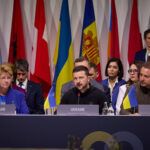Biden-Putin summit advice: Sit in the mud, but reach for the stars
By Konstantin Sonin | June 14, 2021

As a Russian working at an American university, I have a vested interest in any improvement in the US-Russia relationship. I’m approaching the Biden-Putin summit in Geneva on June 16 with some optimism, especially as the relationship between the two countries cannot get worse; in 2021, it reached a nadir.
Inside Russia, the regime presents itself as a defender against aggressive US expansion. In this narrative, the United States wages war by all means, including through proxies such as the European Union, NATO, and former Soviet republics such as Ukraine and Georgia. The government offers a constant barrage of propaganda: US economic sanctions aim to cripple the Russian economy; US negotiations with republics that once belonged to the core of the Russian-Soviet empire threaten Russia’s territorial integrity; insistent US concern about gay and transgender rights is a means to destroy Russia’s national identity and traditions. In Russia, fighting against imagined US aggression is popular.
In the United States, the idea of containing Russia is one of the few items of bipartisan consensus. Historically, there has been no US political constituency for forging a better relationship with Russia. Republicans today are either hawkish or isolationist; there is no love for improving a relationship with Russia in these quarters. And the Democrats are still trying to milk more from Russia’s tangential involvement in the 2016 elections.
I have insight and advice for President Biden. First, Russians construe attempts to limit its territorial expansion as an assault on their heartland. Russians have always felt this way, and 2021 is no different. The Putin regime may have exploited the memory of World War II to mobilize support, yet it is also true that the war was a near-death experience for the Russian nation. Nazis considered Russians, Ukrainians, and other Slavs as Untermensch—inferior people—and Soviet Russia was on the brink of collapse in the fall of 1941, and the German invasion resulted in the annihilation of millions. The trauma has not been fully healed. Russian fear of encirclement and enslavement is real.
Of course, no trauma gives Russia the right to occupy neighboring territories or dictate what other nations do. Yet negotiating without understanding this fear makes little sense. Putin has nothing to gain from propping up the thuggish regime of Belarusian President Alexander Lukashenko. Yet Putin will stick with him until persuaded that a democratic Belarus would be a better, closer partner for Russia.
Second, Russians do not have any particular knowledge or respect for the American system of government or society. A Russian politician would not believe that the media can write something without an order or at least a tacit blessing from the president. For decades, Russian leaders have been confused whenever American presidents refer to the needs of internal politics. For example, they do not understand the concept of a promise conditional on congressional support. Here, I advise President Biden to be simple and clear. That is, if a message requires a subtle interpretation, then skip the message.
President Obama famously reported that he told President Putin to “cut it out” regarding allegations that Russian state agents tried to influence the 2016 elections. I hope that what he actually said was: “Our counterespionage agencies have informed me about your agents’ involvement in the 2016 elections. Please make sure that this activity has stopped.”
To President Putin, I also have insight and advice. First, Americans are not faking their interest in a stable Russia. They are not using their concerns about jailed or exiled politicians as a strategic tool. They actually believe that a Russia without political prisoners inside and thousands of political emigrees abroad would be more stable.
Second, take President Biden seriously. In Russia, Joe Biden is often portrayed as haplessly out of touch or nearly senile. He is neither. He won the US presidential election—a multiyear marathon—against a strong field in his party and a determined incumbent. In his 50 years in the international arena, he has seen and heard a lot. Do not underestimate him.
My hope is that the two presidents will focus on practical concerns: the escalating series of consulate closures, expulsions of diplomats, and reductions of staff in diplomatic missions. These goals might seem small on a big chess board, but they affect many people. Closing Russian consulates in the United States and reducing the workforce of the US consulates does not hurt the Russian government. Yet it does hurt ordinary Russians, especially those who are eager to maintain productive contacts between the two countries. Also, the two-way flow of scientists and students between the two countries—a hallmark achievement of the post-Soviet relationship—has been seriously stressed in recent years.
In the international arena, Russia and the United States might collaborate in productive ways. Every conflict in which the two countries are involved, even tangentially, has potential for mutually beneficial deals. For example, Iran’s nuclear weapons program is a menace for Russia, the United States, and their allies. The United States can also help resolve Russia’s entanglement in eastern Ukraine. Maybe Russia, which is heavily invested in Venezuelan oil, could be persuaded to participate in resolving the humanitarian catastrophe there.
And if all of this fails, Biden and Putin could agree to continue discussing nonstrategic nuclear weapons and new delivery vehicles. The two administrations just prolonged the New START treaty, yet the next renewal deadline is only five years away—a blink in the typically slow-moving nuclear negotiations. Even the Cold War leaders never failed to talk about nuclear disarmament.
Together, we make the world safer.
The Bulletin elevates expert voices above the noise. But as an independent nonprofit organization, our operations depend on the support of readers like you. Help us continue to deliver quality journalism that holds leaders accountable. Your support of our work at any level is important. In return, we promise our coverage will be understandable, influential, vigilant, solution-oriented, and fair-minded. Together we can make a difference.
Keywords: Biden, Putin, Russia, United States
Topics: Nuclear Risk, Nuclear Weapons, Opinion















